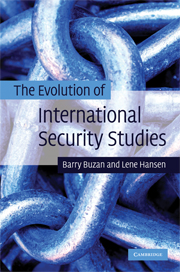Book contents
- Frontmatter
- Contents
- Foreword
- List of abbreviations
- List of figures
- List of tables
- Introduction
- 1 Defining International Security Studies
- 2 The key questions in International Security Studies: the state, politics and epistemology
- 3 The driving forces behind the evolution of International Security Studies
- 4 Strategic Studies, deterrence and the Cold War
- 5 The Cold War challenge to national security
- 6 International Security Studies post-Cold War: the traditionalists
- 7 Widening and deepening security
- 8 Responding to 9/11: a return to national security?
- 9 Conclusions
- References
- Author Index
- Subject Index
1 - Defining International Security Studies
Published online by Cambridge University Press: 05 June 2012
- Frontmatter
- Contents
- Foreword
- List of abbreviations
- List of figures
- List of tables
- Introduction
- 1 Defining International Security Studies
- 2 The key questions in International Security Studies: the state, politics and epistemology
- 3 The driving forces behind the evolution of International Security Studies
- 4 Strategic Studies, deterrence and the Cold War
- 5 The Cold War challenge to national security
- 6 International Security Studies post-Cold War: the traditionalists
- 7 Widening and deepening security
- 8 Responding to 9/11: a return to national security?
- 9 Conclusions
- References
- Author Index
- Subject Index
Summary
International Security Studies (ISS) grew out of debates over how to protect the state against external and internal threats after the Second World War. Security became its watchword (Wolfers, 1952; Yergin, 1978), both distinguishing ISS from earlier thinking and the disciplines of War Studies and Military History, and, as it evolved, serving as the linking concept connecting an increasingly diverse set of research programmes. Looking back on more than sixty years of academic writing on international security, the first pertinent question for an intellectual history of ISS is to define what makes up the sub-field and where the boundary zones between it and adjacent academic disciplines are located.
To delineate ISS is unfortunately not as straightforward an exercise as one might wish. The label ‘international security’ was not adopted from the outset, but only gradually became accepted, and there is no universally agreed definition of what ISS comprises, and hence no accepted archive of ‘ISS-documents’ that define our object of study. As this book will demonstrate, not only is there a large body of ISS literature, it is one whose themes, discussions and participants change across time and place. The composition of ISS has mainly been taken for granted, with the consequence that little self-reflection on what made up ISS or its boundaries has been produced. The absence of a universal definition of what makes up ISS means that ISS has at times become a site for disciplinary politics with different perspectives arguing that they should be included while others (usually different sorts of widening perspectives) should not.
- Type
- Chapter
- Information
- The Evolution of International Security Studies , pp. 8 - 20Publisher: Cambridge University PressPrint publication year: 2009
- 1
- Cited by



